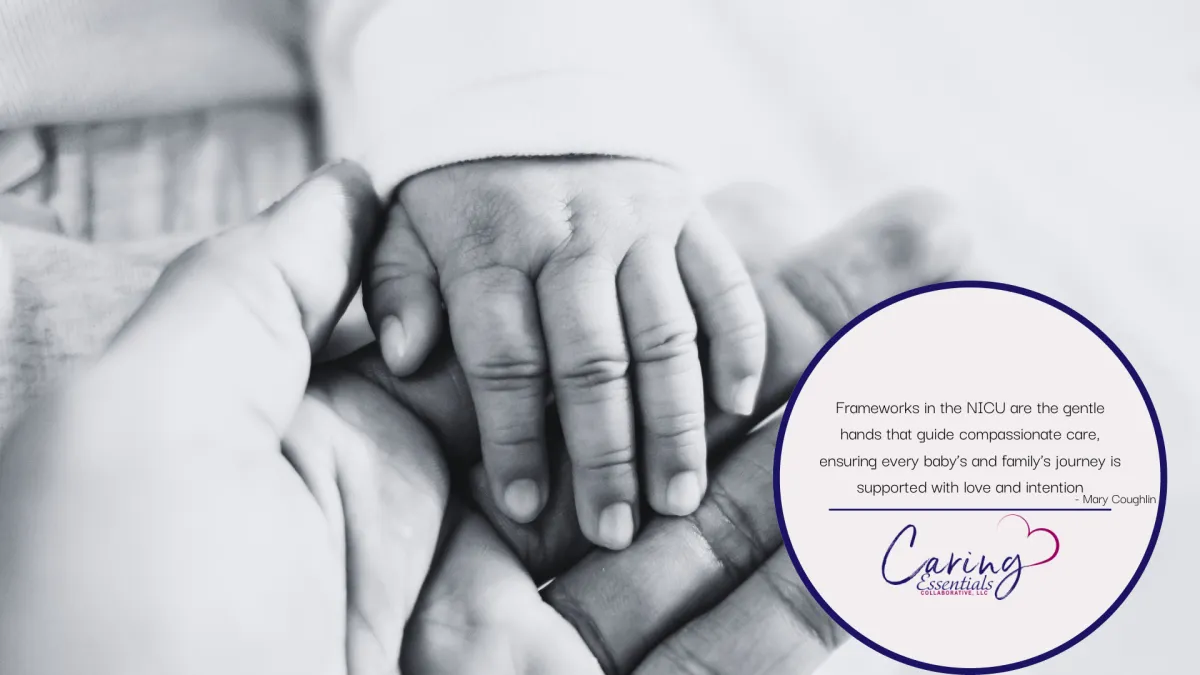
The Essential Role of Frameworks in the NICU: Guiding Compassionate Care
Frameworks in the NICU are the gentle hands that guide compassionate care, ensuring every baby’s journey is supported with love and intention. - Mary Coughlin
Today I want to delve into an integral element of the B.U.F.F.E.R. approach—frameworks. In the Neonatal Intensive Care Unit (NICU), frameworks are the structured guidelines that help us deliver consistent, compassionate, and effective care for babies and families, while also supporting clinician in maintaining the highest quality of care delivery.
Frameworks for Babies
For our tiniest patients, frameworks provide the stability and predictability that are crucial for their development. Newborns in the NICU are incredibly vulnerable, and their care must be meticulously planned and executed. Frameworks ensure that every aspect of their care is aligned with the best available evidence to support optimal development, healing and growth. Consistency in individualized caregiving helps reduce stress and promotes better health outcomes. Frameworks act as a safety net, ensuring that all babies receive the same high standard of care, tailored to their individual needs.
Frameworks for Families
Families in the NICU often feel overwhelmed and uncertain. Frameworks provide them with a clear understanding of what to expect and how they can be involved in their baby’s care. By having structured guidelines and protocols, families can trust that their baby is receiving comprehensive and thoughtful care. This transparency helps build trust and empowers families to participate actively in the caregiving process. When families understand the frameworks guiding their baby's treatment and partner in the creation of caregiving activities and routines, they feel more confident and supported, which is vital for their emotional well-being.
Frameworks for Clinicians
For clinicians, frameworks are essential tools that guide daily practice. In the high-pressure environment of the NICU, having clear protocols and guidelines ensures that care is consistent and efficient. Frameworks reduce variability in care, minimize errors, and improve coordination among the care team. They provide a foundation upon which clinicians can build their expertise and adapt to the unique needs of each baby. Furthermore, frameworks support a culture of continuous improvement, where best practices are regularly updated and shared. This structured approach not only enhances patient care but also supports clinician well-being by reducing uncertainty and stress.
How Frameworks Transform Care
The impact of well-designed frameworks in the NICU is profound and far-reaching. Here’s how they enhance our practice:
1. Standardized Best Practices: Frameworks incorporate the latest evidence-informed practices, ensuring that all care delivered is up-to-date and of the highest quality. This standardization helps achieve the best possible outcomes for babies.
2. Clear Communication: Having structured guidelines facilitates clear and consistent communication among the care team and with families. Everyone understands the plan and their role within it, fostering collaboration and trust.
3. Enhanced Training and Education: Frameworks provide a foundation for training new staff and continuous education for existing team members. They ensure that everyone is equipped with the knowledge and skills needed to provide excellent care.
4. Continuous Improvement: Frameworks are not static; they evolve based on new research and feedback. This commitment to continuous improvement means that the care we provide is always advancing and improving.
5. Emotional Support: Structured care protocols help reduce the emotional burden on families and clinicians by providing clarity and predictability. This emotional support is crucial for maintaining a positive and resilient care environment.
The Ripple Effect of Frameworks
When frameworks are at the core of our practice, the benefits ripple outwards, transforming the NICU experience for everyone involved. Babies receive consistent, high-quality care that supports their growth and development. Families feel informed, empowered, and involved in the care process, enhancing their emotional resilience. Clinicians work within a structured, supportive environment that fosters excellence and reduces burnout.
Let’s commit to embracing and continuously improving our frameworks to ensure that every baby, family, and clinician in the NICU experiences the best possible care.
With unwavering dedication,
Mary Coughlin
